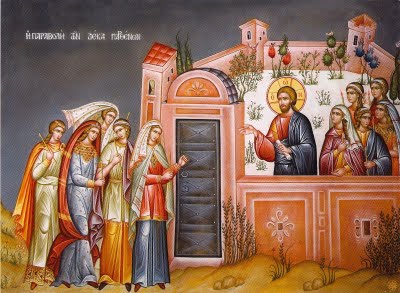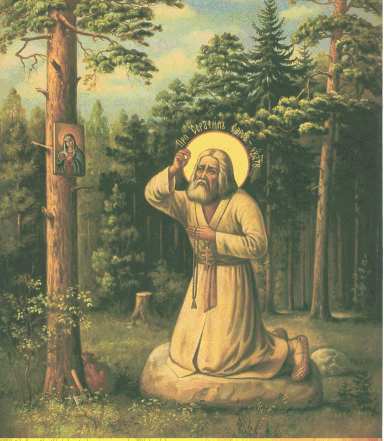A Wonderful Revelation to the World
Oct 2/15 2009 St Anna of Kashin

Today we commemorate St Anna of Kushin, who happens to be the patroness of one of my granddaughters. Many years Ann-banan! The Gospel reading for her service is the Parable of the Ten Virgins.
This parable is one of the most important in all of Scripture, and a proper understanding of it is crucial. The interpreter par-excellence of this Gospel is my Patron, St Seraphim of Sarov. His “Conversation with Motovilov” (also here) contains pearls regarding this parable.
This is worth spending some time on. If you are skimming, at least read St Seraphim’s comments, which follow the Gospel selection.
 Then shall the kingdom of heaven be likened unto ten virgins, which took their lamps, and went forth to meet the bridegroom. (2) And five of them were wise, and five were foolish. (3) They that were foolish took their lamps, and took no oil with them: (4) But the wise took oil in their vessels with their lamps. (5) While the bridegroom tarried, they all slumbered and slept. (6) And at midnight there was a cry made, Behold, the bridegroom cometh; go ye out to meet him. (7) Then all those virgins arose, and trimmed their lamps. (8) And the foolish said unto the wise, Give us of your oil; for our lamps are gone out. (9) But the wise answered, saying, Not so; lest there be not enough for us and you: but go ye rather to them that sell, and buy for yourselves. (10) And while they went to buy, the bridegroom came; and they that were ready went in with him to the marriage: and the door was shut. (11) Afterward came also the other virgins, saying, Lord, Lord, open to us. (12) But he answered and said, Verily I say unto you, I know you not. (13) Watch therefore, for ye know neither the day nor the hour wherein the Son of man cometh. (Mat 25:1-13)
Then shall the kingdom of heaven be likened unto ten virgins, which took their lamps, and went forth to meet the bridegroom. (2) And five of them were wise, and five were foolish. (3) They that were foolish took their lamps, and took no oil with them: (4) But the wise took oil in their vessels with their lamps. (5) While the bridegroom tarried, they all slumbered and slept. (6) And at midnight there was a cry made, Behold, the bridegroom cometh; go ye out to meet him. (7) Then all those virgins arose, and trimmed their lamps. (8) And the foolish said unto the wise, Give us of your oil; for our lamps are gone out. (9) But the wise answered, saying, Not so; lest there be not enough for us and you: but go ye rather to them that sell, and buy for yourselves. (10) And while they went to buy, the bridegroom came; and they that were ready went in with him to the marriage: and the door was shut. (11) Afterward came also the other virgins, saying, Lord, Lord, open to us. (12) But he answered and said, Verily I say unto you, I know you not. (13) Watch therefore, for ye know neither the day nor the hour wherein the Son of man cometh. (Mat 25:1-13)
 Prayer, fasting, vigil and all other Christian activities, however good they may be in themselves, do not constitute the aim of our Christian life, although they serve as the indispensable means of reaching this end. The true aim of our Christian life consists in the acquisition of the Holy Spirit of God. As for fasts, and vigils, and prayer, and almsgiving, and every good deed done for Christ's sake, they are only means of acquiring the Holy Spirit of God. But mark, my son, only the good deed done for Christ's sake brings us the fruits of the Holy Spirit. All that is not done for Christ's sake, even though it be good, brings neither reward in the future life nor the grace of God in this. That is why our Lord Jesus Christ said: He who gathers not with Me scatters (Luke 11:23). Not that a good deed can be called anything but gathering, since even though it is not done for Christ's sake, yet it is good. Scripture says: In every nation he who fears God and works righteousness is acceptable to Him.[1]
Prayer, fasting, vigil and all other Christian activities, however good they may be in themselves, do not constitute the aim of our Christian life, although they serve as the indispensable means of reaching this end. The true aim of our Christian life consists in the acquisition of the Holy Spirit of God. As for fasts, and vigils, and prayer, and almsgiving, and every good deed done for Christ's sake, they are only means of acquiring the Holy Spirit of God. But mark, my son, only the good deed done for Christ's sake brings us the fruits of the Holy Spirit. All that is not done for Christ's sake, even though it be good, brings neither reward in the future life nor the grace of God in this. That is why our Lord Jesus Christ said: He who gathers not with Me scatters (Luke 11:23). Not that a good deed can be called anything but gathering, since even though it is not done for Christ's sake, yet it is good. Scripture says: In every nation he who fears God and works righteousness is acceptable to Him.[1]
…
"In the parable of the wise and foolish virgins, when the foolish ones lacked oil, it was said: 'Go and buy in the market.' But when they had bought, the door of the bride-chamber was already shut and they could not get in. Some say that the lack of oil in the lamps of the foolish virgins means a lack of good deeds in their lifetime. Such an interpretation is not quite correct. Why should they be lacking in good deeds if they are called virgins, even though foolish ones? Virginity is the supreme virtue, an angelic state, and it could take the place of all other good works.
"I think that what they were lacking was the grace of the All-Holy Spirit of God. These virgins practiced the virtues, but in their spiritual ignorance they supposed that the Christian life consisted merely in doing good works. By doing a good deed they thought they were doing the work of God, but they little cared whether they acquired thereby the grace of God's Spirit. Such ways of life based merely on doing good without carefully testing whether they bring the grace of the Spirit of God, are mentioned in the Patristic books: 'There is another way which is deemed good at the beginning, but it ends at the bottom of hell.'
"Antony the Great in his letters to Monks says of such virgins: 'Many Monks and virgins have no idea of the different kinds of will which act in man, and they do not know that we are influenced by three wills: the first is God's all-perfect and all-saving will: the second is our own human will which, if not destructive, yet neither is it saving; and the third is the devil's will—wholly destructive.'
And this third will of the enemy teaches man either not to do any good deeds, or to do them out of vanity, or to do them merely for virtue's sake and not for Christ's sake. The second, our own will, teaches us to do everything to flatter our passions, or else it teaches us like the enemy to do good for the sake of good and not care for the grace which is acquired by it. But the first, God's all-saving will, consists in doing good solely to acquire the Holy Spirit, as an eternal, inexhaustible treasure which cannot be rightly valued. The acquisition of the Holy Spirit is, so to say, the oil which the foolish virgins lacked. They were called foolish just because they had forgotten the necessary fruit of virtue, the grace of the Holy Spirit, without which no one is or can be saved, for: 'Every soul is quickened by the Holy Spirit and exalted by purity and mystically illumined by the Trinal Unity.' [2]
"This is the oil in the lamps of the wise virgins which could burn long and brightly, and these virgins with their burning lamps were able to meet the Bridegroom, Who came at midnight, and could enter the bridechamber of joy with Him. But the foolish ones, though they went to market to buy some oil when they saw their lamps going out, were unable to return in time, for the door was already shut.
The market is our life;
the door of the bridechamber which was shut and which barred the way to the Bridegroom is human death;
the wise and foolish virgins are Christian souls;
the oil is not good deeds but the grace of the All-Holy Spirit of God which is obtained through them and which changes souls from one state to another—that is, from corruption to incorruption, from spiritual death to spiritual life, from darkness to light, from the stable of our being (where the passions are tied up like dumb animals and wild beasts) into a Temple of the Divinity, into the shining bridechamber of eternal joy in Christ Jesus our Lord, the Creator and Redeemer and eternal Bridegroom of our souls.
Priest Seraphim Holland 2009. St Nicholas Russian Orthodox Church, McKinney, Texas
This article is at:
&
New Journal entries, homilies, etc. are on our BLOG: http://www.orthodox.net/redeemingthetime
Journal Archive: http://www.orthodox.net/journal
Blog posts & local parish news are posted to our email list. Go to here: http://groups.google.com/group/saint-nicholas-orthodox-church to join.
Redeeming the Time BLOG: http://www.orthodox.net/redeemingthetime
Use this for any edifying reason, but please give credit, and include the URL of the article. This content belongs to the author. We would love to hear from you with comments! (seraphim@orthodox.net)
grace of the All-Holy Spirit of God which is obtained through them and which changes souls from one state to another—that is, from corruption to incorruption, from spiritual death to spiritual life, from darkness to light, from the stable of our being (where the passions are tied up like dumb animals and wild beasts) into a Temple of the Divinity, into the shining bridechamber of eternal joy in Christ Jesus our Lord, the Creator and Redeemer and eternal Bridegroom of our souls.
Years ago before many welcomed foreigners arrived , I was in the barn with a candle reading a troparia with snow blowing. The choir on the north was my daughter’s pony and foal. Their look made call the Synod and ask for a priest to come to Dallas.
Your writing was able to express the wills I viewed that evening in the snow.
I had never before really understood this parable beyond it being a warning to be prepared for Christ’s return. St. Seraphim’s explanation extends that warning further to a call to take care and look deeply at my motives for doing the work I am doing. The idea that we could be doing all the right things for all the wrong reasons and end up being caught unawares in the end is frightening. But I am reassured with the thought that if I can truly pray with the psalmist,”Search me, O God, and know my heart: try me, and know my thoughts:And see if [there be any] wicked way in me, and lead me in the way everlasting.” then God will dig down deep and expose any false and wicked motives underlying deeds that I might think are perfectly harmless or even very good.
Just recently I ran across this apocryphal story from the New Testament: “On the same day, seeing one work on the sabbath, he said unto him: Man, if indeed thou knowest what thou doest, thou art blessed: but if thou knowest not, thou art cursed, and a transgressor of the law.” I’m not quite sure why I thought of this in connection with this parable except that in both cases it is awareness, as opposed to mindlessness that seems to make the difference between right and wrong, life and death. Through constant seeking to root out and expose sin in my life, I can keep my motives pure and holy and thus preserve and increase the grace (oil) of God in my life. If I slip into a mindless state where my actions and decisions are unconsciously driven by my own selfish desires, or worse, demonic influence then I will find that in the end I have no oil in my lamp. This is not as easy as it seems. It requires constant vigil and a recognition of my tendency towards self deceit–as well as the Enemy’s intent to keep me clueless. “There is a way that seems right to a man, But its end is the way of death.” Fortunately, the Lord has brought me to a place where I can get help in examining my motives, exposing sin and acquiring oil for my lamp.
Making sure my deeds are motivated by the love of God and the acquiring of His grace is complicated by another factor. I have found that in almost everything I do, whether it be good deeds, an ascetic practice or a confession of sin, my motives are mixed. Even when I sincerely desire to help someone, I can often also feel the desire to have my good deed recognized, appreciated or admired by others. Even when I think I am fasting or abstaining from something for holy reasons, I discover that there are sometimes other, less holy, motives involved. And often in my remorse over some sin, I discover that mixed in with my sorrow over offending the Lord is a prideful fear of failure or looking bad in front of others.
Does this mean that all my tainted good works, asceticism or repentance are of no use to my soul? Does no ‘oil’ come from things done with less than entirely pure motives?
If I had to be absolutely sure that my motives were entirely pure, entirely untainted by selfish motives, I would never be able to do anything! It is good to do a prayerful examination of my heart, mind and soul beforehand, but that is not always possible (and even when I’ve done that I sometimes discover later that some sneaky subconscious selfish motive escaped detection.)
All I can do is to continue sincerely praying to the Lord to “Search my heart….” and examine the motives for all my deeds, past, present and those I intended to do in the future and when there is found “any wicked way in me”, confess and repent–and continue to seek the grace of God, the Oil of my Lamp, through constant communing with Him.
Father, Bless.
Thank you all!
Deborah, your thought of the self-deceit…As for me, I realize to a hight extent that I often am in such a state. I often try comfort myself with good reasoning, inventing noble motivations. The key motivation, I’m afraid, is that I want to look good. In this respect after reading Father’s post I for the first time life as a market – my life concretely. We are on the market, but the purposes are different. I thought – some come there to buy, some – to sell. I felt myself as a seller. What I do is trying to sell myself – at a good price, make a good bargain, show off. The payment form can be different: reassurance, encouragement, appraisal, “applause”…It seems to me I’d gladly accept everything – except the truth. The truth might be too sharp & ugly. well, I tried so hard, I came to the market, I stand there trying to pay people’s attention to me, making my goods more & more attractive. And if someone doesn’t care, I take offense. It hardly strikes me that he doesn’t want to buy my things not because he is so dull & unable to understand how nice they are, but that they are far from being nice. and useless.
Such things happen, I think, maybe because I do not feel myself the worst sinner. That I don’t have anything to offer, to sell. That I am poor, and need to buy myself. And I need to realize what I should by – unless it becomes too late…OIL! The beginning of humility – realization of oneself as a poor sinner, makes a person anxious to run to the market of life and look for the necessary…and a person looks for it attentively, devotedly, without taking care of oneself, without lingering on trifles – as he knows what he needs. and he cherishes the time that is slipping by…
Self-deceit derives from self-justification.
The Saint Spirit is pure. And can be obtained with entirely pure motives. No association of the Light with the darkness… Your words led me to this feeling, Deborah.